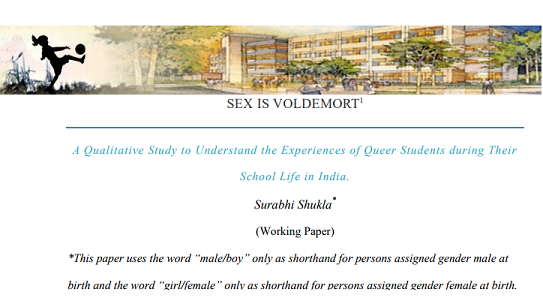
Research Findings
Abstract
I present the results of a first of its kind qualitative study to understand the experiences of queer students during their K-12 education in India. “Queer” signifies various counter-heteronormative identities apart only from lesbian, bisexual, gay and transgender (Narrain and Bhan, 2005; Menon, 2008). Using semi-structured interviews with self- identified queer persons of <=25 years of age, focus group discussions and expert interviews, I develop a coding scheme based in grounded theory and guided by Olweus’ (1993) definition of bullying.
I find that: 1. Gender non-conforming students are labelled as gay, lesbian or transgender, and are bullied verbally, physically, sexually and relationally by students, teachers and administrators, regardless of their actual sexual orientation or gender identity. 2. Schools are sex negative with little or no sexuality education, and no policies prohibiting such bullying. 3. Perhaps, due to the androcentricism and invisibility of female sexuality, gender non-conforming PAGFB are subjected to less bullying than gender non-conforming PAGMB, up to a certain point. 4. Complaints are either trivialized or bullied students are blamed for bringing this upon themselves by being gender non-conforming. Bullied participants report isolation, depression, fall in grades and educational aspiration, suicidal ideation and increased absenteeism but many also excel academically and in co-curriculars. Some love school as it is the only place that they can be themselves. Participants and experts suggest that comprehensive sexuality education and inculcating equal respect through effective school and state based policies may create more inclusive school climates.
I attempt a model Anti-Discrimination and Sexual Rights Policy based on my findings, legal decisions and suggestions from participants and experts.

Final article on findings
Taking it Forward
Participant Feedback
Circulated the findings among the participants and invited suggestions for improvement and authenticity.
Expert Feedback
Presented the findings of the research at a focus group of experts in the field and invited suggestions.
Peer Review
Presented the findings of the research at the Xth Conference of the International Association for the Study of Sexuality, Culture and Society in 2015. The conference was titled, “Literacies and Sexualities in the Cultural, Fictional, Real and Virtual Worlds: Past, Present Future Perfect?” Also presented findings at a conference titled “Deconstructing the Gender Binary: A Dialogue on Expression, Identity and Legal Recognition” at the West Bengal National University of Juridical Sciences, Kolkata in July 2016, and at the 4th LASSnet international conference titled, “Thinking with Evidence: Seeking Certainty, Making Truth” in New Delhi in December 2016. The findings of this research were also presented and discussed in breakout sessions at Leiden University’s SOGI Summer School in August 2019.
Model Policy
Drew up a model policy titled “Sexual Rights and Anti- Discrimination Policy” for schools to adopt based on the findings of the study. This policy incorporates suggestions of the participants and the experts in the field. More details can be found at the following link.
Government Engagement
Submitted the model policy for consideration to the Government of India and the Government of Haryana for the proposed revision of the National Education Policy (in 2016).
Teaching Materials
Drafted a chapter based on the findings for Tarshi’s Online Course on CSE for Teachers and Educators. The chapter can be found here. Also provided input at needs assessment to SAATHII’s teacher training manual on sexuality and gender.
Youth Engagement
Wrote and circulated a fictional short story, “Bandar Aur Insaan” based on the findings of the research which can be found here. Also conducted a session on the findings of the study with youth activists from youth lead organizations in India, Nepal and Bangladesh as part of a training programme organized by ARROW and TARSHI.
Final Publication
School Interactions
Interacted with school teachers in Jamshedpur to discuss the findings and how possibly they may address such matters. Click Here